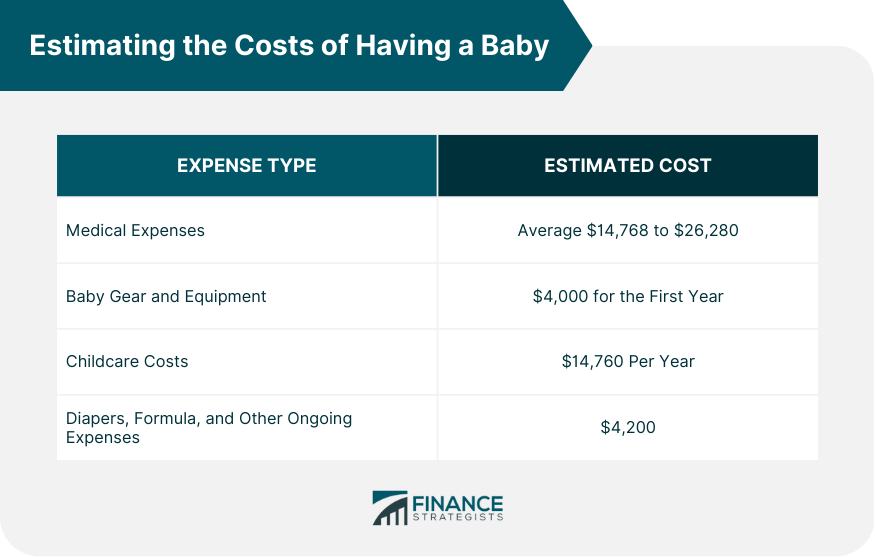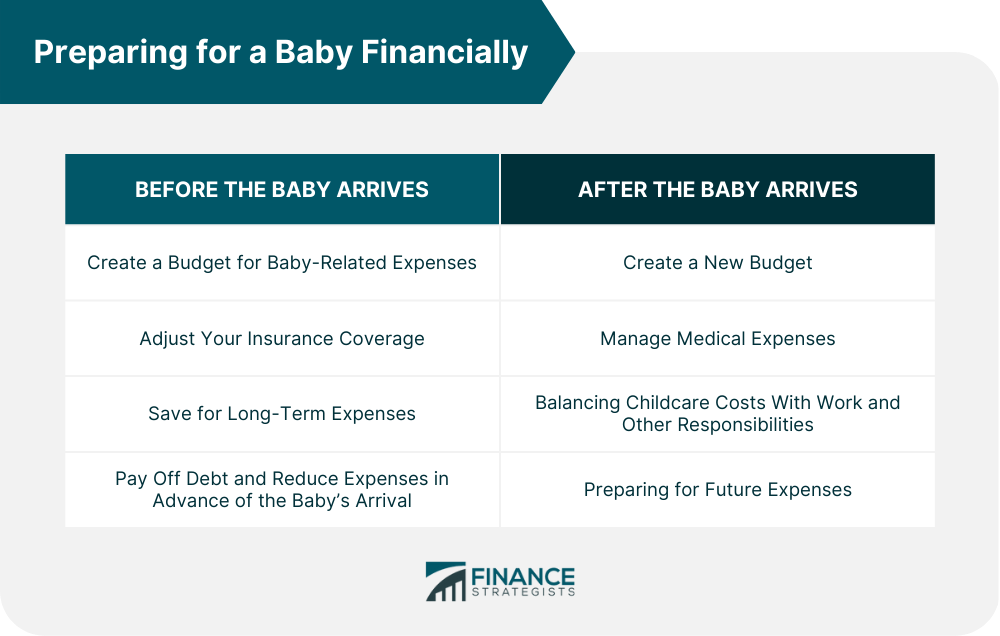Planning for a baby can be one of the most exciting and rewarding experiences in life, but it can also be stressful, especially when it comes to finances. From the cost of prenatal care to the expenses of diapers, child care, and future education costs, there are numerous financial considerations to make when starting a family. Planning for a baby financially is crucial for a stable and secure future for your family, regardless of whether it is your first or fifth. Before you start planning for a baby, it is essential to understand the associated costs. Knowing how much money you will need can help you create a realistic budget and avoid financial surprises down the line. Below are some of the most significant expenses to consider when estimating the costs of having a baby. Prenatal care, delivery costs, and postnatal care can add up quickly. According to a 2022 report by the Peterson-Kaiser Family Fdn. (KFF) Health System Tracker, the average cost of a vaginal birth in the United States is $14,768, and the average cost of a cesarean section is $26,280. These costs can vary depending on your location, insurance coverage, and specific medical needs. It is crucial to talk to your healthcare provider and insurance company to understand what your medical costs will be. Many insurance plans cover prenatal care and delivery, but you may still have out-of-pocket expenses. If you are uninsured, you may be able to find low-cost or free prenatal care through community health clinics or Medicaid. Cribs, strollers, car seats, high chairs, and other items can add up quickly. According to the baby cost calculator by the website BabyCenter, the average cost of baby gear for the first year is around $4,000. There are many ways to save money on baby gear and equipment. Consider buying secondhand items from consignment shops, online marketplaces, or friends and family. You can also ask for hand-me-downs from friends or family members who no longer need them. Additionally, some items like high chairs and baby bathtubs can be skipped altogether or replaced with more affordable alternatives. Childcare costs are another significant expense associated with having a baby. According to a 2023 report by Illumine.com, the average cost of full-time daycare for an infant in the United States is $14,760 per year. This cost can vary significantly depending on your location, the type of childcare you choose, and the age of your child. There are several ways to reduce childcare costs. Consider enlisting the help of family members or friends to watch your child, or look for more affordable childcare options like in-home daycare providers. Some employers offer childcare benefits or subsidies, so be sure to check with your employer to see if these benefits are available. You will also have ongoing expenses that can add up when you have a baby. According to the same baby cost calculator from BabyCenter, the average cost of diapers, formula, toiletries, solid food, and others for the first year is around $4,200. One way to save money on diapers and formula is to buy them in bulk. Many retailers offer discounts when you buy larger quantities, and some even offer subscription services that automatically deliver these items to your doorstep. Additionally, consider using cloth diapers instead of disposable ones, as they can be less expensive in the long run. Now that you have a better understanding of the costs associated with having a baby, it is time to prepare your finances. Below are some tips for getting your finances in order before the baby arrives. Your budget should include all the costs associated with having a baby, including medical expenses, baby gear and equipment, childcare, and ongoing expenses like diapers and formula. When creating your budget, be sure to consider any changes in your income or expenses that may occur after the baby arrives. For example, you may need to adjust your budget to account for a reduction in income if you or your partner takes time off work to care for the baby. It is crucial to have an emergency fund in place. It is especially true when planning for a baby, as unexpected medical bills or other costs can arise. Aim to save at least three to six months' worth of living expenses in an emergency fund. Adjustments can include health, disability, and life insurance. Review your policies to ensure that you have adequate coverage for medical expenses, including prenatal care and delivery costs. Furthermore, consider adding a life insurance policy if you do not already have one to ensure your family is financially protected in case of your untimely death. In addition to short-term expenses like diapers and formula, it is important to save for long-term expenses like a college education. Consider opening a college savings account, such as a 529 plan, to start saving for your child's future education expenses. These accounts offer tax advantages and can help you save more efficiently. Before the baby arrives, it is essential to pay off any high-interest debt and reduce your expenses as much as possible. Doing so can help free up more money in your budget to put toward baby-related expenses. Consider consolidating high-interest debt with a personal loan or credit card balance transfer to save on interest charges. While finance management may be challenging in the face of your baby-related expenses, it is essential to ensure that your family's financial future is secure. Below are some tips for managing your finances after the baby arrives. After the baby arrives, you will need to create a new budget to account for changes in income and expenses. It may include adjusting your budget to account for a reduction in income if you or your partner takes time off work to care for the baby. You may also need to account for ongoing expenses like diapers, formula, and childcare costs. Be sure to review your health insurance policy to understand your coverage for your baby's medical expenses. Additionally, consider setting up a flexible spending account (FSA) or health savings account (HSA) to help cover out-of-pocket medical expenses. Balancing childcare costs with work and other responsibilities can be challenging, but there are several ways to make it more manageable. Consider enlisting the help of family members or friends to watch your child, or look for more affordable childcare options like in-home daycare providers. Some employers offer flexible work schedules or telecommuting options, so be sure to explore these options if they are available. Even after the baby arrives, it is important to continue preparing for future expenses like education and extracurricular activities. Consider continuing to save for your child's education expenses and explore ways to save on extracurricular activities like sports or music lessons. Starting early with long-term expenses may afford you lower costs. Planning for a baby financially is a challenging but essential step to ensure that your family's financial future is secure. Estimating the costs of having a baby, preparing your finances for a baby, and managing your finances after the baby arrives are all crucial steps. By following these tips, you will be better equipped to handle the financial challenges of starting and raising a family. Remember to review your finances regularly and adjust your budget and savings plan as necessary to ensure you are on track to meet your financial goals. Consult a qualified financial advisor for expert guidance in budgeting and managing your expenses and savings.Overview of Planning for a Baby Financially
Estimating the Costs of Having a Baby
Medical Expenses
Baby Gear and Equipment
Childcare Costs
Diapers, Formula, and Other Ongoing Expenses

Preparing Your Finances for a Baby
Create a Budget for Baby-Related Expenses
Build an Emergency Fund for Unexpected Costs
Adjust Your Insurance Coverage
Save for Long-Term Expenses
Pay Off Debt and Reduce Expenses in Advance of the Baby's Arrival
Managing Your Finances After the Baby Arrives
Create a New Budget
Manage Medical Expenses
Balancing Childcare Costs With Work and Other Responsibilities
Preparing for Future Expenses

The Bottom Line
Preparing for a Baby Financially FAQs
Some essential financial considerations to make when preparing for a baby include estimating the costs of having a baby, creating a budget for baby-related expenses, building an emergency fund, adjusting your insurance coverage, saving for long-term expenses, and paying off debt and reducing expenses in advance of the baby's arrival.
You can estimate the costs of having a baby by considering expenses like medical costs, baby gear and equipment, childcare costs, and ongoing expenses like diapers and formula. Talk to your healthcare provider and insurance company to understand your medical costs, and look for ways to save on baby gear and equipment by buying secondhand or asking for hand-me-downs from friends or family.
To reduce childcare costs when preparing for a baby financially, consider enlisting the help of family members or friends to watch your child, or look for more affordable childcare options like in-home daycare providers. Some employers offer childcare benefits or subsidies, so be sure to check with your employer to see if these benefits are available.
Having an emergency fund when preparing for a baby financially is important because unexpected expenses can arise, such as medical bills or unexpected time off work. Aim to save at least three to six months' worth of living expenses in an emergency fund to ensure that you are prepared for unexpected expenses.
To manage your finances after the baby arrives, create a new budget to account for changes in income and expenses. Be sure to review your health insurance policy to understand your coverage for your baby's medical expenses, and consider setting up a flexible spending account (FSA) or health savings account (HSA) to help cover out-of-pocket medical expenses. Finding ways to save on ongoing expenses like diapers and formula can also help free up more money in your budget.
True Tamplin is a published author, public speaker, CEO of UpDigital, and founder of Finance Strategists.
True is a Certified Educator in Personal Finance (CEPF®), author of The Handy Financial Ratios Guide, a member of the Society for Advancing Business Editing and Writing, contributes to his financial education site, Finance Strategists, and has spoken to various financial communities such as the CFA Institute, as well as university students like his Alma mater, Biola University, where he received a bachelor of science in business and data analytics.
To learn more about True, visit his personal website or view his author profiles on Amazon, Nasdaq and Forbes.











